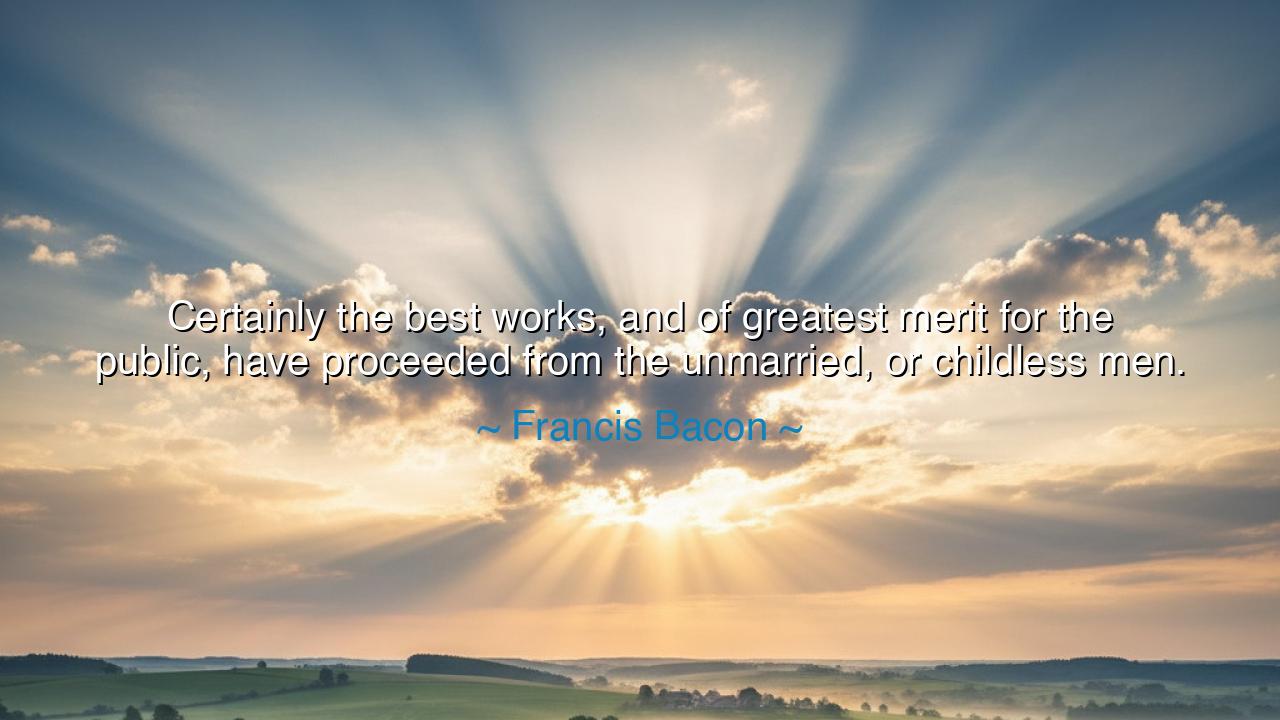
Certainly the best works, and of greatest merit for the public
Certainly the best works, and of greatest merit for the public, have proceeded from the unmarried, or childless men.






The words of Francis Bacon, “Certainly the best works, and of greatest merit for the public, have proceeded from the unmarried, or childless men,” reveal a truth drawn from the long observation of human nature and history. Spoken by a philosopher who saw life through the lens of reason and experience, this statement reflects not a disdain for family, but an understanding of freedom, focus, and sacrifice. Bacon, ever the seeker of wisdom, recognized that those who are bound to no private obligation are often freer to devote themselves wholly to the service of the world. For to give oneself to all mankind, one must first be unbound by the ties that hold the heart to a few.
In the age of Bacon, the seventeenth century, men wrestled with the balance between duty to the household and duty to humanity. The family was sacred, yet Bacon observed that the world’s greatest achievements—in philosophy, exploration, and invention—often came from those who stood alone. The unmarried man, he argued, is like a vessel unanchored, carried wherever purpose or vision leads him. He has no personal kingdom to protect, no lineage to preserve, and thus he can labor for truth, for progress, and for posterity with undivided energy. His life is not his own—it belongs to the idea he serves. In that sense, Bacon saw such men as the instruments of destiny itself.
History, indeed, bears witness to his claim. Consider Isaac Newton, who lived without wife or child, yet unveiled the laws that bind the cosmos. His solitude was not emptiness but concentration—the stillness in which the universe revealed its order. Or think of Leonardo da Vinci, who, unburdened by domestic life, wandered through art, science, and invention with the boundless curiosity of one married only to creation itself. Their works did not nourish one household, but all generations. They are proof of Bacon’s observation that genius often blooms most fiercely in solitude, when the heart’s energy is not divided between private affection and public endeavor.
Yet Bacon’s words also carry a somber undertone, for they remind us that greatness often comes with loss. The man who serves all cannot belong entirely to any one soul. To create something of lasting power, he must give up the warmth of the hearth for the fire of purpose. It is the old paradox of the world: the more one gives to humanity, the less one keeps for oneself. The saint, the philosopher, the artist—all must, in some measure, renounce the comforts of ordinary life. Even Christ Himself, in the Christian faith Bacon so deeply studied, lived unmarried, belonging not to one home but to all humankind. The solitary path, then, is not one of lovelessness, but of a greater love that stretches beyond the boundaries of blood.
However, Bacon does not say that the married or the child-bearing cannot achieve greatness. Rather, he distinguishes between private virtue and public achievement. The parent contributes to the world by shaping souls; the philosopher contributes by shaping ideas. The one builds a home, the other builds a civilization. Both acts are noble, yet the latter requires a certain detachment from the immediate ties of affection. The family man’s thoughts are often drawn to his children’s needs, his household’s safety, and his own posterity; but the solitary thinker gives himself wholly to the future of mankind. His “children” are his works, his discoveries, his teachings—immortal offspring born not of flesh, but of mind and spirit.
In this way, Bacon’s wisdom calls us to reflect on the different paths of service. Some are chosen to nurture the small circle of family, others to labor for the greater circle of humanity. Neither is lesser, but they cannot always coexist easily. The one who would serve the many must sometimes walk alone; the one who would love deeply must sometimes forsake ambition. Bacon, himself a man of immense public duty and inner solitude, understood this tension intimately. He did not celebrate celibacy for its own sake, but for the freedom it affords to the soul that would serve without limit.
So let this teaching be passed down: every calling demands a sacrifice, and the measure of one’s greatness lies in what one is willing to surrender. If your path calls you toward the world, be prepared to walk with loneliness as your companion. If it calls you toward the hearth, embrace it with tenderness and devotion. For both paths, when walked with sincerity, serve life’s divine design. Yet remember always that the unmarried spirit, unfettered and unclaimed, bears a sacred burden—to live not for comfort, but for creation; not for possession, but for posterity. As Francis Bacon teaches, those who give themselves wholly to humanity often live without the bonds of family—but their legacy becomes the family of all mankind.






AAdministratorAdministrator
Welcome, honored guests. Please leave a comment, we will respond soon